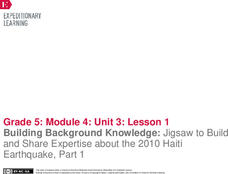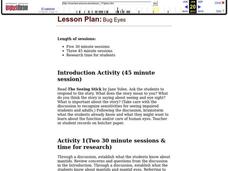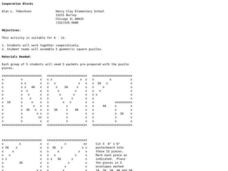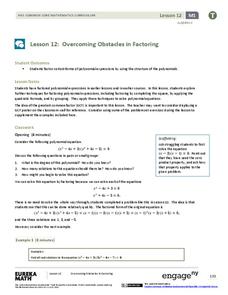EngageNY
Adding to Cascading Consequences and Stakeholders: Industrial Food Chain
Young researchers create a class Cascading Consequences chart to see how the industrial food chain affects people, animals, and the environment. They also work in teams to complete a Stakeholders chart for the industrial food chain model...
EngageNY
Creating a Visual Component for the Speech: End of Unit Assessment Preparation and Practice
Eye contact, volume, pronunciation. Working with partners, scholars practice presenting their speeches about the best food chain. Additionally, they choose a visual component to support their end-of-unit speech.
Health Smart Virginia
Class Rules
Scholars complete a worksheet describing their hopes and dreams then work with a partner to discuss the importance of class rules. Learners brainstorm a list of rules to be compiled and displayed for all pupils to reference.
EngageNY
Building Background Knowledge: Jigsaw to Build and Share Expertise about the 2010 Haiti Earthquake, Part 1
Using the Jigsaw protocol, scholars study chunks of text from a speech given by former US presidents following a devastating 2010 earthquake in Haiti. As they read the speech in small groups, they build background knowledge and share...
EngageNY
Researching about the Red Cross, Continued: Who Is the Red Cross and What Does This Multinational Organization Do?
Code red! Learners read an informational article about the Red Cross, discussing the gist of the text in small groups. On a three-column note catcher, pupils take notes to show how the Red Cross functions as a multinational aid...
Overcoming Obstacles
Coping Skills
A lesson challenges scholars to identify life stressors and list ways to cope. Learners create a "Coping with Emotions" book detailing the importance of responsibly working through our feelings.
Curated OER
Team Works
Young scholars define "group" and list American social and political movements throughout history. They examine one model of a successful team and positive group mentality by reading and identify the traits of a successful group and...
Curated OER
Body Systems
In this body systems lesson, students work in small groups conduct research to become an 'expert' on one of the 7 body systems. Students present their findings to the class via power point, poster, or song.
Curated OER
Who Works for Nonprofit Organizations? (6-8)
Learners explore career opportunities in the nonprofit sector. In this career exploration lesson, students listen to guest speakers who work for nonprofit organizations explain their jobs. Learners also examine the role of nonprofit...
Curated OER
Money Matters
In small groups students examine the Senate plan and four sample plans
from individuals. Clarify vocabulary as needed. Students discuss good
and bad points in plans.Students create a group budget plan.Student groups send their plans to...
Curated OER
Bug Eyes
Students explore mantid eyes and human eyes. In this mantid eyes and human eyes research lesson, students work in small groups to gather information. Students read books, observe mantids, and do experiments. Students then present their...
Curated OER
Motor Skills and Movement Patterns
Students explore the human body by participating in physical activities. For this physical education lesson, students demonstrate their physical prowess and motor skills by performing tasks such as climbing and rope tying. Students...
PBS
Ebola Outbreak
As of April, 2016, more than 28,000 suspected cases of Ebola were recorded in Western Africa with over 11,000 human deaths. Classes discuss the Ebola virus outbreak in 2014 and then groups develop an action plan based on research,...
Curated OER
Communicating at work: Listening strategies and skills
Students play a game of "Gossip" to explain the importance of active listening skills. They learn active listening skills through group discussion, lecture and small group exercises.
Curated OER
A Close Look at the First Two Paragraphs of the Declaration of Independence
Twelfth graders identify the key phrases of the first two paragraphs of the Declaration of Independence and interpret the meaning of those key phrases. Students work in small groups to analyze the paragraphs and answering questions...
Southern Nevada Regional Professional Development Program
Common Core Reading Standards: Understanding Argument
What does your class know about logical fallacies? They can find out quite a bit and practice identifying logical fallacies if you follow the steps and use the resources provided here! After reviewing ethos, pathos, and logos, ask small...
Curated OER
A Small Book of Small Things
Learners explore size relationships as they collect pictures of the small things in their world. In this early childhood math and literacy lesson, students gain an understanding of size differences and develop fine-motor and literacy...
Curated OER
Do Individuals Matter?
Students work together to discuss the benefits of choosing a career in business verses a humanitarian career. They identify the values and knowledge needed in each career. They share their thoughts with the class and answers questions.
Curated OER
Cooperation Blocks
Students work together in groups to assemble squares by using cut pieces of poster board. In this cooperative learning instructional activity, students each have their own pieces that match with other group members pieces to create a...
Curated OER
Word Families
First graders listen as they are read a book containing exmaples of word families, they listen for rhyming words. They focus on word families, words that have rhyming sounds and share the same spelling patterns. Pupils work in small...
Curated OER
How a Circuit Works
Young scholars explore the differences between parallel and series circuits by designing and constructing several different circuits. In small groups, they use miniature light bulbs, wires, and nine-volt batteries to build the circuits...
Curated OER
Bill Irwin: All in a Day's Work
Students perform for an audience. In this performing arts lesson, students explore the work of actor Bill Irwin in a variety of roles. Students direct and perform a fairy tale in small groups .
Workforce Solutions
Workplace Ethics
An activity that focuses on workplace ethical dilemmas asks groups how to respond to a series of scenarios. First, the class brainstorms a list of ethics that apply to employers, then a second one that applies to employees. Using their...
EngageNY
Overcoming Obstacles in Factoring
What do you do when factoring doesn't work? Learners complete the square when faced with quadratic expression that don't factor traditionally. They then use factoring by grouping to solve polynomial equations.

























